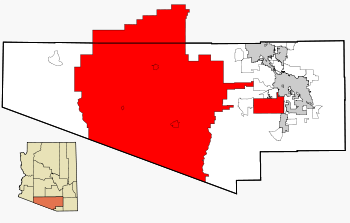Tohono Oʼodham Indian Reservation
32°09′01″N 112°02′41″W / 32.15028°N 112.04472°W


The Tohono Oʼodham Indian Reservation, is an Indian reservation of the Tohono Oʼodham Nation in Arizona, United States.[1] The reservation had a 2020 census population of 9,561. It has an area of 4,340.984 square miles (11,243.098 km2), 97.48 percent of the Tohono Oʼodham Nation's total area. The reservation encompasses parts of central Pima, southwestern Pinal, and southeastern Maricopa Counties.
The land is also the site of the Quinlan and Baboquivari Mountains, which include Kitt Peak, and the Kitt Peak National Observatory and telescopes, as well as Baboquivari Peak. These astronomical sites are under lease from the Tohono Oʼodham Nation. The lease was approved by the council in the 1950s, for a one-time payment of US$25,000 plus $10 per acre per year.[2]
When Spaniards first encountered the tribe in 1694, they made note of one of the tribe's inhabited villages called Batki, a site that was abandoned around 1850.[3] Batki was in what is now the Sells District of the Tohono O'odham Nation.
Tohono Oʼodham Nation communities
editYou can help expand this section with text translated from the corresponding article in German. (September 2024) Click [show] for important translation instructions.
|
Communications
editThe telephone area code for the Tohono Oʼodham Reservation is 520.
References
edit- ^ "Home". Official Website of the Tohono Oʼodham Nation. 2014. Retrieved 2014-04-24.
- ^ "Astronomy Development on Another Sacred Mountain: Kitt Peak". Mauna Kea – From Mountain to Sea. Na Maka o ka Aina. 2005. Archived from the original on 2008-08-20. Reprinting material from the Arizona Daily Star, 2005.
- ^ Fontana, Bernard L.; Robinson, William J.; Cormack, Charles W.; Leavitt, Earnest E. (1962). Papago Indian Pottery. Seattle, Washington: University of Washington Press, on behalf of the American Ethnological Society. pp. 17, 34. OCLC 869680.
- ^ Clement L. Garner, Triangulation in Arizona, p. 141, Washington: US Government Printing Office, 1941.